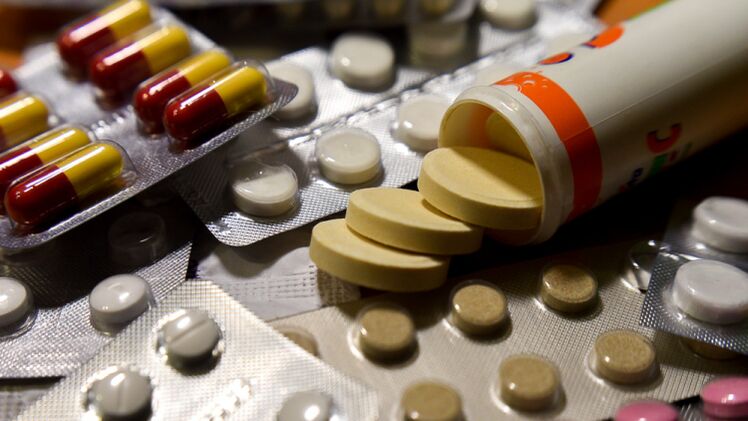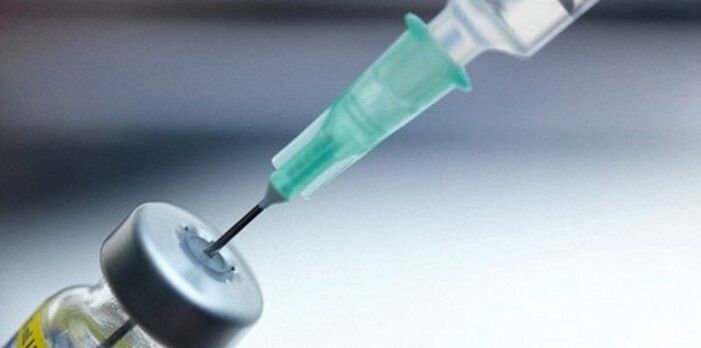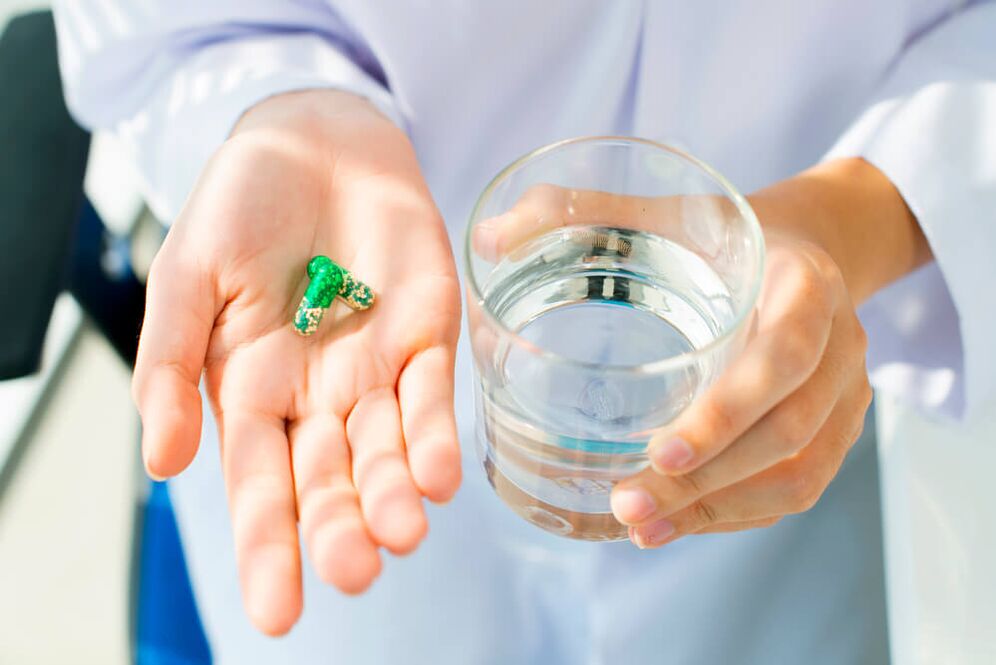Prostatitis is a fairly common male disease.
It can be infectious and contagious, the first form is divided into bacterial and non-bacterial.
Treatment of prostatitis with antibiotics is carried out with an infectious bacterial lesion of the gland, although the symptoms are not very obvious.
It is sometimes prescribed as a test treatment for non-bacterial forms.

Antimicrobials actively affect the pathogenic microflora, destroy the pathogens of inflammation, and broad-spectrum antibiotics also prevent complications that can affect the genitourinary system.
Classification of antibiotics for prostatitis
In acute or chronic inflammation, the doctor selects a drug from one or more groups of antibiotics to which the microbes are sensitive. This is determined by the results of the analysis.
All antibacterial agents can be divided into the following groups:
- penicillin;
- tetracycline;
- aminoglycoside;
- cepholosporin;
- fluoroquinolones;
- macrolide.

Penicillin group
Penicillin-based drugs are broad-spectrum antibacterial agents.
In this case, the substance can be of natural or synthetic origin. The advantage of this group of drugs is the affordable price and the ability to use tablets (or suspensions) at home.
Among the extensive list of penicillin antibiotics, the most common is penicillin of the same name, which is prescribed for the most chronic inflammation.
Tetracycline group
As an antibiotic for prostatitis, tetracycline can be prescribed as an ointment for external use or as a tablet for oral administration.
The substance is rapidly absorbed into prostate tissue, effectively killing streptococci, staphylococci, salmonella, chlamydia, Shigella and a large group of other microbes.
Recently, due to the large number of side effects (especially from the gastrointestinal tract), tetracycline drugs are less used in urology.
Disadvantages of the drug include the formation of resistance of microorganisms to tetracycline drugs and a number of side effects:
- intestinal colic;
- nausea;
- digestive disorders;
- anemia;
- eosinophilia;
- increased intracranial pressure;
- liver damage;
- allergy.
Aminoglycoside group
The drug has long been used as an antibiotic for prostatitis in men with broad-spectrum effects. However, these drugs are very toxic.
The most common use of the drug, which is highly effective in combating gram-negative pathogens of bacterial inflammation, including Pseudomonas, Proteus, Klebsiella, Salmonella, Enterobacteriaceae.
They are inexpensive and quickly absorbed into the blood - the maximum plasma concentration is reached one hour after ingestion.
Disadvantages of funds:
- Limited spectrum of activity - used only as an adjunct in the complex treatment of inflammation of the prostate gland to combat certain pathogenic microorganisms.
- It can cause many side symptoms, including headache, kidney failure, vomiting, nausea, hearing loss, anemia, leukopenia, drowsiness, oliguria (a decrease in the amount of urine excreted relative to normal) and others.
- The drug is not sold orally - it is injected and injected into the gastrointestinal tract.
Group of cephalosporins
These antibacterial agents are not intended for oral administration and are administered parenterally. It is often prescribed for inpatients.
The drug acts on gram-positive pathogens, a small group of anaerobes and gram-negative bacteria.
Means to combat complex prostatitis caused by E. coli, enterobacter, gonococcus, staphylococcus, Proteus, Klebsiella and other pathogens are often prescribed.
When penicillins, tetracyclines, and other antibiotics cannot control the infection, doctors use these drugs.
Additional advantages of the drug include an acceptable price and minimal contraindications (except for sensitivity to this type of antibiotic).
Like all antibacterial agents, cephalosporins have side effects:
- Headache;
- allergic skin rashes and local reactions at the injection site;
- diseases of the stomach and intestines;
- colitis, etc.
Fluoroquinol group
These drugs are used in the complex treatment of chronic inflammation of the prostate, because they penetrate quickly into the glandular tissues and have a long-lasting effect.
If the disease is caused by mycobacteria, gram-positive and gram-negative microorganisms, chlamydia or mycoplasma, it is recommended to drink them.
Side effects include ICP, tachycardia, fatigue, leukopenia, anemia, and renal impairment in addition to vomiting, nausea, and diarrhea, which are characteristic of antibiotics.
It is important!Medications cannot be combined with certain medications. For example, in combination with adenosergic drugs, it dramatically lowers blood pressure. It is also not recommended to take drugs in combination with non-steroidal anti-inflammatory drugs, because their combination increases the negative effects on the nervous system.
Macrolide group
It is sometimes used to treat prostatitis caused by chlamydia or mycoplasma. However, their effectiveness against other potential pathogens has not been confirmed.
Treatment regimen
The doctor decides which type of antibacterial agent to take after performing tests to determine the type of pathogen and its sensitivity to the drug.
Antibiotics are just one part of the treatment of acute and chronic infectious prostatitis, which includes a whole list of complementary medications.
The standard therapy system includes:
- Antibacterial drugs - to destroy the source of inflammation.
- Circulatory stimulants - to exclude blood stasis in the small pelvis.
- Anti-inflammatory drugs - to relieve swelling and pain.
- Immunomodulators - protect and activate the body's defense system;
- Sedatives;
- Vitamins and trace elements (zinc, magnesium, selenium, vitamins A, B, C, E);
- Herbal infusions and teas (elderberry, lingonberry, St. John's wort, comfrey);
- Exercise and prostate massage - to stimulate blood circulation and reduce congestion.

Acute inflammation
In the acute form, both home treatment and inpatient treatment are possible under the supervision of a physician.
In this case, a comprehensive and broad-spectrum drug is prescribed: first, they refer to strong drugs from the list of cephalosporins and switch to fluoroquinolones with improvements.
Sometimes it is advisable to take two types of antibiotics at the same time for the fastest possible treatment.
In acute inflammation, the reaction to the drug manifests itself quite quickly - the symptoms disappear within a few days.
Despite the relief of the condition, you can not stop the course and change the dose prescribed by a urologist. This can lead to a chronic form of the disease and bacterial resistance to drugs.
If everything is done correctly, prostatitis is treated 100% without complications.
Chronic process
Compared to the acute form, the treatment of slow inflammation with periodic exacerbations is more complicated and lengthy. This is due to changes in the prostate tissue in which the cells are less sensitive to antibacterial drugs and "keep" them.
However, the following groups of antibiotics are most effective for chronic walking:
- cephalosporins;
- fluoroquinolones;
- macrolides.
The duration of therapy is at least a month, but in general it is not enough, so the doctor prescribes several courses at once. Even better, it is important to follow these rules: the feeling can be deceptive and will only aggravate the problem.
The result
When the symptoms of prostatitis appear, do not waste time looking for solutions in forums and thematic sites. It is important to consult a doctor before the disease worsens and complications begin with serious consequences for men's health.
























